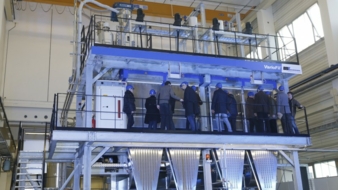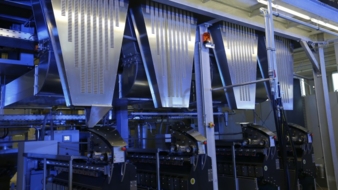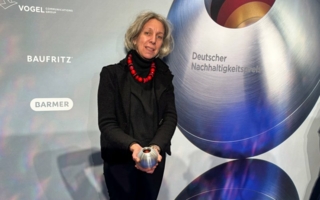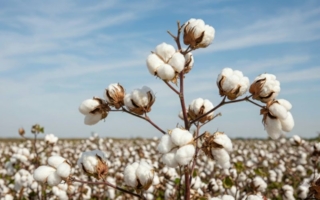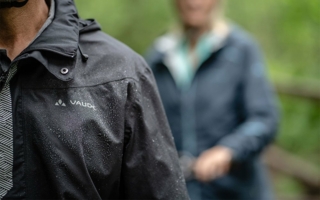30/04/2015 — auf Deutsch lesen
BB Engineering: Sustainable performance
The textile world today just would not be the same without polyester fibres. Given that fibre production is on the rise, the exploitation of used raw materials is gaining importance. The spinning of used PET bottles is not, however, without its problems. By developing the VarioFil R+, a compact spinning machine designed for niche markets, machinery maker BB Engineering has solved many of the challenges involved in this complex process.
The global demand for textile fibres is on the ascent. Production volumes are growing every year, crossing the 90 million tonne threshold for the first time in 2013. The demand is largely met by man-made fibres which account for 54.4 million tonnes (2013) of the overall total. Of this, polyester is comfortably in the lead with 74%. The majority of polyester is manufactured in China, mostly processed into clothing and home textiles and traded all over the world. To meet the needs of the mass market, spinning mills require big spinning machines which, depending on the model, are capable of producing up to 600 tonnes of polyester fibres every day.
The fibre market in Europe is a completely different kettle of fish. Gone are the days when it focused on mass production. Indeed, today’s industry is devoted to special applications for technical textiles. Not surprisingly, therefore, spinning machine makers are being asked to deliver highly flexible systems capable of coping efficiently with smaller production volumes. These machines also have to process recycled materials, as used raw materials become an increasingly important economic factor. Of course, reusing resources also constitutes an important part of a company’s sustainability policy – irrespective of whether it is a legal requirement or simply seen by the firm as a matter of principle.
With an annual total of 8.2 million tonnes of used PET drinking bottles at its disposal, the polyester fibre industry can be a major beneficiary of used materials. For these bottles to begin a new life as textile fibres, they have to undergo a complex process. After sorting, they are chopped into flakes, washed and dried. The flakes are melted down again, using in some cases high levels of thermal energy, to make extrudable chips. It is precisely this final process that robs the material of some of its commercial and environmental advantages. From a sustainability point of view, it makes far more sense to spin the preliminary product into fibres. In Europe, these flakes are around 20% cheaper than PET and rPET chips.
The flakes, however, place certain demands on their preparation and processing. They lack not only a high apparent density but also the handling properties required for the transportation steps in a spinning machine. The cleanliness of the former bottles remains a nagging issue, which is why the melt has to undergo an extremely fine filtration procedure before it can be spun into fibres. This presents machinery makers with a significant challenge: the impurities brought in with the flakes mean that the filters have to be changed once a fortnight. Using conventional thermal or mechanical/chemical methods, this process can take around 24 hours. The spinning mills greatly depend on flexibility and fast response times, making this a bitter pill to swallow. Fortunately, this has become a problem of the past.
BB Engineering, based in Remscheid, Germany, has succeeded in slashing the time needed for filter cleaning to just four hours. The detachable filter is steam cleaned at 265°C without residues or the addition of chemicals and can be used again immediately. This system is integrated in the latest generation of spinning machines, the VarioFil R+ which is a compact spinning machine for processing rPET flakes and chips. It has an output of around 500 kg polyester yarns (POY – pre-oriented yarn), which can be dope-dyed as required. In this case, liquid dyes are added during the spinning process and worked into the melt. This means that producers no longer depend upon master batches which give rise to between two and five metric tonnes of dyed filament. It will, therefore, be possible in future to supply the market with smaller volumes of coloured rPET filaments and in doing so, enhance the sustainability of synthetic fibres still further.
The first-ever VarioFil R+ was presented to a select audience during the Open House event at BB Engineering in Remscheid on 21 January 2015. The company invited 130 customers from Europe, the Near East and Asia to this unique event which climaxed with the live demonstration of the machine. After some introductory presentations, that shed light on the challenges faced in rPET fibre production, the guests were invited to take a look at the machine, which produced dope-dyed, black POY polyester fibres (150 Denier, 48 filaments – 150f48) from rPET flakes. They were subsequently texturised in an Oerlikon Barmag machine. The guests were also given the opportunity to inspect special technical solutions – including the filter cleaning system (White Filter Cleaning) and the WINGS winding technology from Oerlikon Barmag. The animated discussions between the participants and staff from BB Engineering and Oerlikon suggest that the VarioFil R+ is in tune with current needs and trends. This is hardly surprising, given that the machine is claimed to produce small lots of high-quality fibres both with and without dyeing, whilst using affordable raw materials and boasting short set-up times. What more could one ask of a spinning machine?
[ www.bbeng.de]
[Sabine Anton-Katzenbach]
BB Engineering ist ein 1997 gegründetes Joint Venture zweier Weltmarktführer: Der Spinnanlagenhersteller Oerlikon Barmag (Remscheid) und der Hersteller von Filmfertigungsanlagen, Brückner Group (Siegsdorf), halten jeweils 50 Prozent der Anteile. Das Unternehmen ist auf Extrusionstechnologie und die Herstellung von Kompaktspinnanlagen des Typs VarioFil (ehemals Barmag) spezialisiert. Zum Angebot gehören außerdem Dienstleistungen wie die Entwicklung von Sondermaschinen oder Auftragsarbeiten für komplette Baugruppen. Insgesamt beschäftigt der Maschinen- und Anlagenbauer 120 Mitarbeiter (2013) und erwirtschaftete in demselben Jahr 35 Millionen Euro Umsatz.

